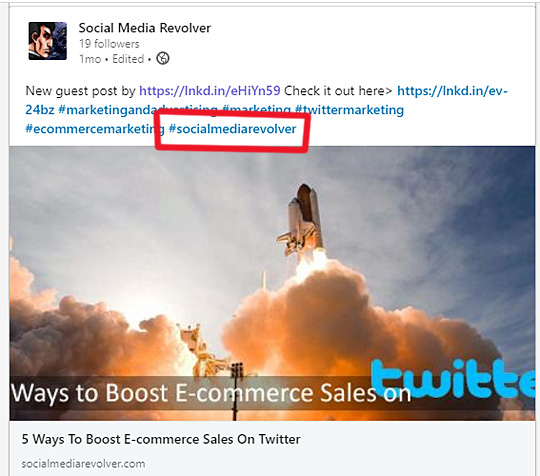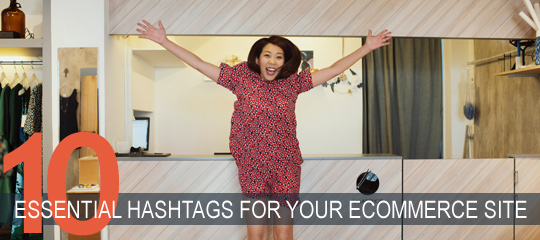
Starting a new eCommerce business? Or just need some fresh hashtags to use?
Whatever the answer, you need to be using these 10 essential hashtags for your eCommerce site.
Thanks to the rise of social media, it’s now easier than ever to spread visibility and awareness of your website through various online apps at the click of a button.
It is a great way to grow your business in terms of traffic, which usually ends up converting into profit and that’s something we all definitely want more of especially when running an eCommerce store.
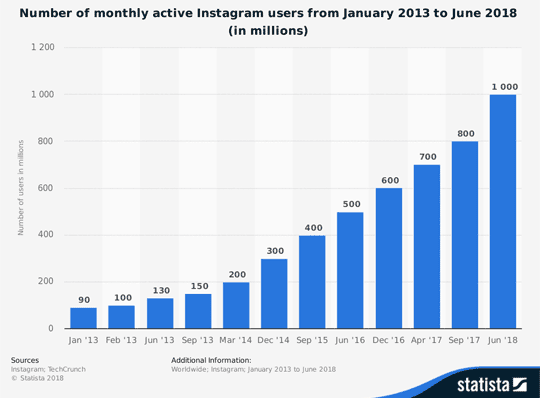
With over 1 billion users on Instagram each month, it is absolutely a tool that you need to be taking advantage of, whether you’re already a large scale business or you’re yet to sell your first product.
Most forms of social media allow you to reach new audiences, chat with existing ones and promote any products or services you’re selling which are all important practices in running a successful business.
The likes of Facebook (no pun intended), Instagram and Twitter allow you to reach an unprecedented amount of users, provided you use the right hashtags of course. According to Social Media Today, statistics show that having even just one hashtag can boost engagement by around 12.5%.
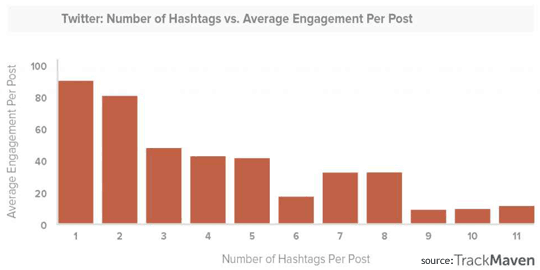
Which leads us to our main question:
“What Hashtags Should You Be Using For eCommerce?”
Honestly, the answer depends on the sort of industry you’re in. eCommerce is quite vast in definition and literally stands for ‘commercial transactions conducted electronically on the Internet.’
There is no perfect hashtag for each eCommerce business, instead, you need to pick the best ones suited towards your industry and the type of product you sell.
The ones included in this article are generally good for all types of eCommerce businesses so definitely add them to your posts or tweets.
We’ve scoured multiple free tools and compiled a lot of good starting hashtags essential for eCommerce that will help you find new customers, spread visibility about your business and how to maintain a healthy relationship with your current followers.
Why Bother Using Hashtags For eCommerce?
There are several good reasons why you should be using hashtags with your eCommerce projects. Here are just a few:
⦁ Grow Your Follower Base – Using the right hashtags extends your reach to users who may be actively looking for products you sell or the content you post. Once they find you, it gives them the option to look at what you post and this could lead to a new follower.
⦁ Boost Your Visibility As a Business – Adding hashtags to your posts will put your business out there on the specific social media platform which allows plenty of people to stumble across it.
⦁ Increase Your Sales – Whilst hashtags boost your social media presence, they can also increase the profit you’re able to create as it helps you reach out to users who are specifically interested in your products. They may already be looking to purchase a product your business sells, but may not know about you yet. This now gives them the opportunity.
⦁ Tap Into a Niche Community – Perhaps you sell web hosting solutions for small scale businesses and you’re looking for people who might be interested in people who need web hosting. You could reach out to this specific niche in the hopes people will sign up for the services you sell. On the flip side, you could post helpful tips about websites or web hosting that people will enjoy. The right hashtags help you find people who are already interested in what you have to offer.
Here Are The Best Hashtags For eCommerce In 2020
1. #ecommerce (both Twitter and Instagram)
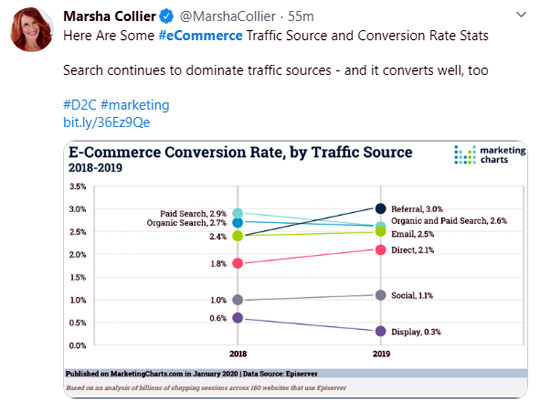
Sounds pretty obvious, right? If you’re going to be running an eCommerce site, you need to be using that specific hashtag. It accounted for 55% of eCommerce hashtags across Instagram, Twitter, Facebook, and Tumblr for the year of 2019 with over 4.4m posts actually including that hashtag. That’s a lot of posts – and untapped potential.

Be sure to include this into your next social media post for higher engagement.
2. #(your business here)
[See related post: 5 Ways To Boost E-commerce sales On Twitter]
This is an example of a branded hashtag. You’ll want to create a hashtag of your own business when posting to social media. This could be your company name or even something like a campaign you’re running. Whatever it is, it needs to be directly linked to your business.
This builds brand awareness as well as brand identity and can help you stand out from the crowd. Just ensure that your hashtag isn’t already being used and that once you pick a sensible hashtag, you run with it and make sure it’s included in the rest of your future posts.
3. #(popular events)

You’ll want to use seasonal or holiday-based hashtags for things like Christmas, Easter or even holidays like Valentine’s Day. Would your products make good gifts for those you care about? Make sure you include some hashtags in your posts as this is a great way to promote discounts or reward loyalty, etc. Some examples could be #christmasgifts, #happyeaster, #giftsforhim/her or #valentines.
4. #business
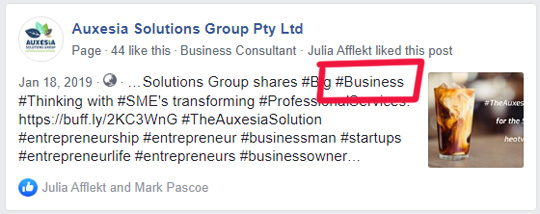
Another important, basic hashtag but one you definitely need to be including. It is a rather ‘broad’ word, but the goal here is exposure. If someone sees your post out of the many millions and decides to follow, you’ve already reaped some of the rewards hashtags have to offer. This hashtag gets over 4.7 million hits per hour on Twitter, but it will still be well utilized on any form of social media so definitely include it in your posts.
5. #shopify #magento #woocommerce #bigcommerce
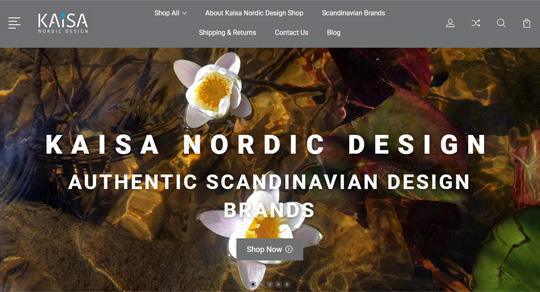
A lot of eCommerce websites are based on Big Commerce or Shopify, so it makes sense to include this as a hashtag into your social media posts.
Shopify and Big Commerce are some of the biggest eCommerce platforms out there so their respective hashtags will be actively searched for on Instagram and Twitter.
The others are also platform-specific hashtags – it may be worth adding those in if your website was created on any one of them.
6. #onlineshopping
This is basically what eCommerce is in a nutshell so you’ll want to use it as a baseline hashtag in your posts. There are over 1,300 posts with this hashtag per hour on Instagram and 39 million in total so the search volume is quite high for this one. Chuck this one into posts for more visibility.
7. #(niche hashtags)
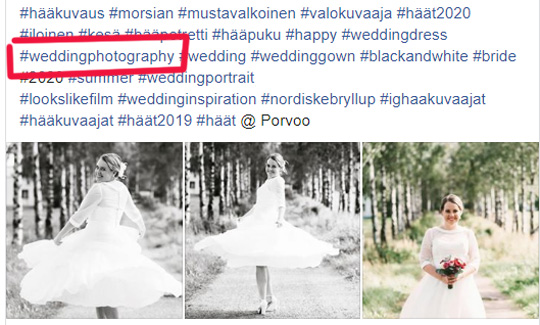
Gaining a wider audience by including more broad terms such as #business and #ecommerce is a good move, but on the other hand, sometimes it is better to narrow down your focus.
This is where including a niche hashtag is essential for your eCommerce business as it allows you to reach a smaller community, but one that might be directly interested in what you’re selling.
Examples of this include being a wedding photographer; photography being the focus and weddings being the niche. Consider adding a hashtag like this to your posts to find a more specific conglomerate of users.
8. #(trending hashtags)
These will be hashtags that are popular on Instagram/Twitter for various reasons, but more than likely will be related to a specific event occurring at the current time. This could be something like an ongoing event (Australian bushfires) for example.
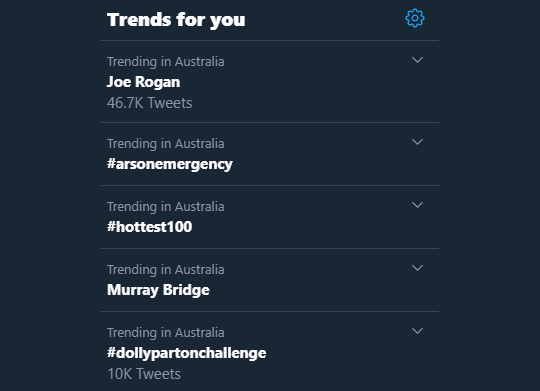
You could mention that some proceeds you make from sales will be donated to fight the bushfires – this is a good way to build brand reputation and gain some followers. You’ll want to make sure that the hashtag relates to your business in some way and is not inappropriate.
9. #marketing
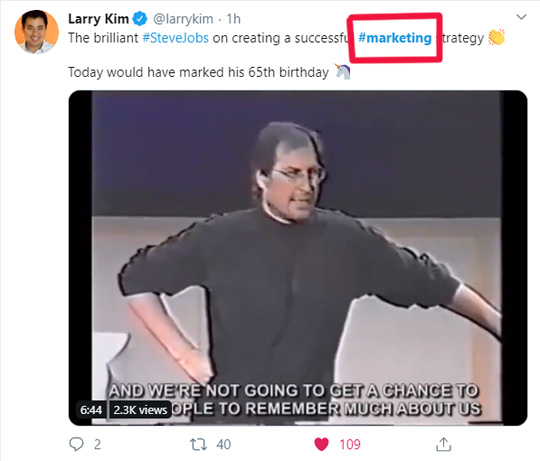
This is another basic, good hashtag to include in your Instagram posts or tweets on Twitter.
Whilst your business may not directly be marketing related, social media hashtagging is arguably a form of marketing itself; you’re trying to market your business to other users in the hopes of visibility and profit. The #marketing hashtag gets over 6.2 million views on Twitter per hour so it is one you should definitely consider using.
10. #fashion
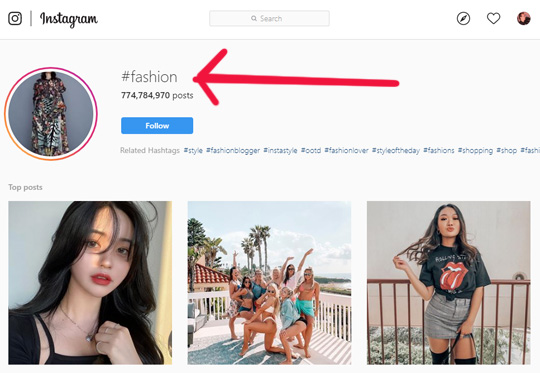
This hashtag may not apply to everyone, but there are over 765 million posts for fashion with millions being added each week.
The #fashion hashtag receives a lot of traffic and if you are running a fashion e-commerce store, you’d be crazy not to include this hashtag. This allows users to see the unique clothing you offer and the popularity of fashion seems to be ever growing so it’s not an opportunity you want to miss out on!
Manual Research & Practicing Good Values Are Also Key
Websites such as Sistrix, Hootsuite, Sendible and Iconosquare are all great tools in helping you find similar hashtags that will prove useful for your posts or tweets but they are not the end-all. Sometimes, it pays off to do your own manual labor and see what works and what doesn’t.
There is no harm in experimenting with hashtags, you may find what boosts your engagement and you will also see what doesn’t.
Analyze your Instagram reach through Insights (if you have a business account) and consider mixing up your hashtags to lower reach ones. After all, data-based decisions are the way to go as they give a clear indication of what is doing well and what isn’t.
It’s also important to make sure you aren’t going overboard with your hashtags as more hashtags don’t necessarily mean more engagement. The magic number seems to be 11 (see the graph in the beginning of this post) when it comes to the number of hashtags per post. Keep this in mind!
As mentioned before, if you’re going to pick a trending hashtag, make sure it is appropriate and not controversial. This can be bad for business if you’re associating with a negative topic.
On that note, if you screw up, make sure you ask for feedback. This is a good way to show users that you care about what they have to say and might give you a chance to redeem yourself.
Bad post? No problem, #feedbackplease is the way to go.
Summary
In summary, make sure you are including some of these essential broad eCommerce hashtags to reach wider audiences.
You’ll also want to ensure that you’re including some niche hashtags to reach a more specific community, who may already be interested in what you have to offer.
This will, in turn, provide you with more quality followers, spread awareness about your business and boost your sales provided that you are also doing your own manual research and testing as well as following good practices.
Remember to keep your hashtags to a reasonable number and to ask for feedback on your posts or tweets if you notice users complaining – this is a good way to repair or maintain relationships.
What are you waiting for? Get out there and start earning those followers!
[Images – Main Photo by BBH Singapore on Unsplash; other images from their respective websites and/or social platforms]
Dylan Perry is a digital marketer with expertise in SEO and SEM. He previously worked in web hosting for many years and has now moved onto growing his own marketing company, SEO Kings in order to help clients improve their online presence and convert their traffic into sales.
